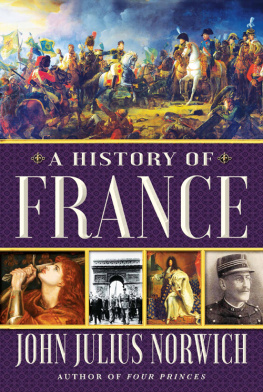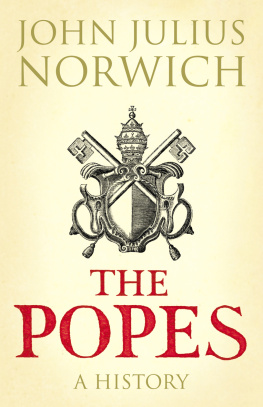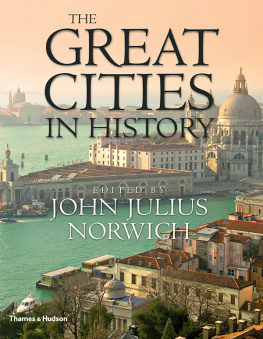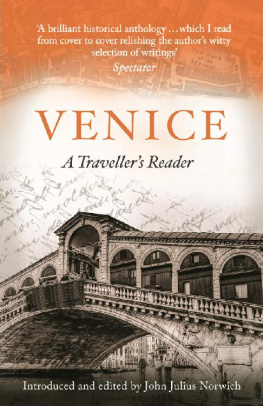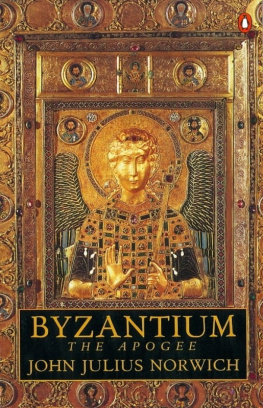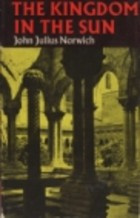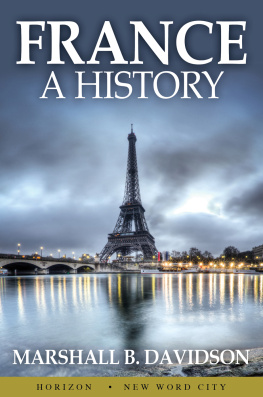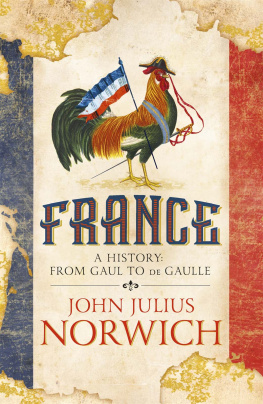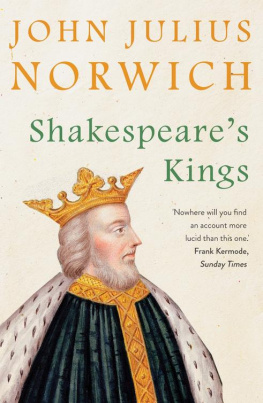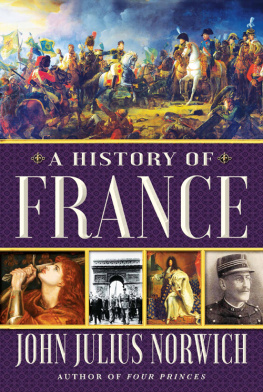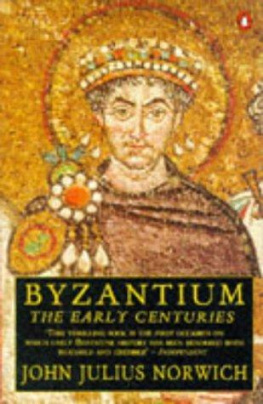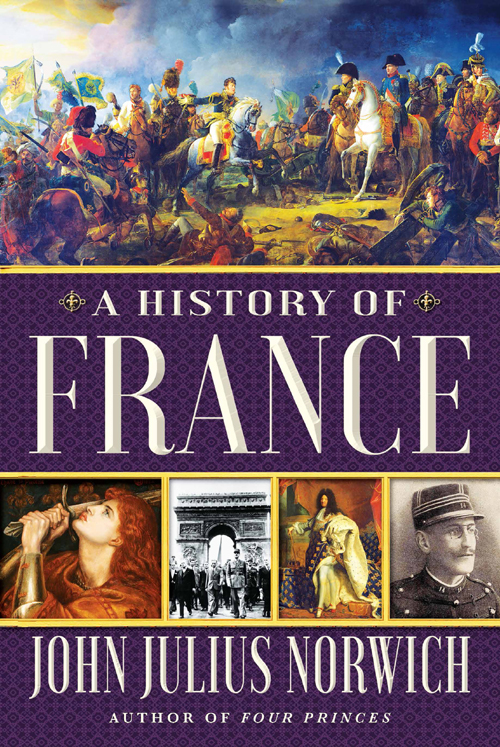Mount Athos (with Reresby Sitwell, 1966)
The Normans in the South (1967)
Sahara (1968)
The Kingdom in the Sun (1970)
A History of Venice: The Rise to Empire (1977)
A History of Venice: The Greatness and the Fall (1981)
Fifty Years of Glyndebourne (1985)
A Taste for Travel (1985)
The Architecture of Southern England (1985)
A History of Byzantium: The Early Centuries (1988)
Venice: A Travellers Companion (1990)
A History of Byzantium: The Apogee (1991)
A History of Byzantium: The Decline and Fall (1995)
A Short History of Byzantium (1997)
The Twelve Days of Christmas (1998)
Shakespeares Kings (1999)
Paradise of Cities: Venice in the Nineteenth Century (2003)
The Middle Sea: A History of the Mediterranean (2006)
Trying to Please (2008)
The Popes: A History (2011)
A History of England in 100 Places (2011)
Sicily: A Short History (2015)
Four Princes (2016)
Edited by John Julius Norwich
Great Architecture of the World (1975)
The Italian World (1983)
Britains Heritage (1983)
The New Shell Guides to Great Britain (198790)
The Oxford Illustrated Encyclopaedia of Art (1990)
The Treasures of Britain (2002)
The Duff Cooper Diaries (2005)
The Great Cities in History (2009)
Darling Monster (2013)
Cities that Shaped the Ancient World (2014)
An English Christmas (2017)
A History of France
JOHN JULIUS NORWICH

Copyright John Julius Norwich 2018
Maps drawn by Rodney Paull
Cover design by Royce M. Becker
Cover artwork, from top, clockwise: The Battle of Austerlitz, by Gerard, Francois Pascal Simon, Baron (1770-1837) Bridgeman; Captain Alfred Dreyfus Len Collection /Alamy; Louis XIV in Royal Costume, by Rigaud, Hyacinthe Francois (1659-1743) Bridgeman; General de Gaulle walking down the Champs-Elysees, 1944 Science History Images/Alamy; Joan of Arc, by Rossetti, Dante Gabriel Charles (1828-82) Bridgeman
All rights reserved. No part of this book may be reproduced in any form or by any electronic or mechanical means, including information storage and retrieval systems, without permission in writing from the publisher, except by a reviewer, who may quote brief passages in a review. Scanning, uploading, and electronic distribution of this book or the facilitation of such without the permission of the publisher is prohibited. Please purchase only authorized electronic editions, and do not participate in or encourage electronic piracy of copyrighted materials. Your support of the authors rights is appreciated. Any member of educational institutions wishing to photocopy part or all of the work for classroom use, or anthology, should send inquiries to Grove Atlantic, 154 West 14th Street, New York, NY 10011 or .
First published in Great Britain in 2018 by John Murray (Publishers), an imprint of Hachette UK
Printed in the United States of America
First Grove Atlantic hardcover edition: October 2018
Library of Congress Cataloging-in-Publication data is available for this title.
ISBN 978-0-8021-2890-4
eISBN 978-0-8021-4670-0
Atlantic Monthly Press
an imprint of Grove Atlantic
154 West 14th Street
New York, NY 10011
Distributed by Publishers Group West
groveatlantic.com
18 19 20 21 10 9 8 7 6 5 4 3 2 1
To the memory of my mother
who first took me to France
and taught me to love it as she did.
T OUTE MA VIE , je me suis fait une certaine ide de la France. looked after me while my mother was doing the cure and talked French to me from morning till night.
There were two more pre-war trips, one with both my parents for a week in Paris during which we did all the usual things. We took a bateau mouche down the Seine, went to the Louvre which bored me stiff and to the sewers which I found fascinating, climbed on to the roof of the Arc de Triomphe, where you get a far better view of Paris than you do from the Eiffel Tower, which is like looking at it from an aeroplane. Of course we did the Eiffel Tower as well, not only going had ever seen. But the company was by no means only French; there were visiting English, and Americans, and anyone whom my parents knew and happened to be passing through.
Looking back on those days, I have only one regret: I was two or three years too young. I was, I think, moderately precocious for my age, but all these celebrities were only names to me; I called Jean Cocteau Jean and mixed him dry martinis, but I had never read a word he had written. Had I been eighteen in 1944 instead of fifteen I would have known and learnt so much more. But there: no complaints. I was lucky to have been there at all.
My father deliberately scheduled his official tours to coincide with my holidays, so we visited every corner of the country. At Easter 1945, just as the war was about to end, we drove south past the occasional rusting and burnt-out tank for my first sight of the Mediterranean, the blueness of which after the green-grey Channel I shall never forget. In 1946, with a school friend, I bicycled through Provence from Avignon to Nice; but the combination of the intense heat, the battle-pitted roads and the endless punctures (thanks to synthetic rubber inner tubes) made the journey only a partial success. In 1947, while waiting to join the navy, I also spent six months living with a delightful Alsatian family in Strasbourg, attending lectures in German and Russian (which I had begun with a Linguaphone course at the age of twelve) at the university. I enjoyed Strasbourg enormously, apart from the hideous embarrassment caused by my landladys constant attempt to de-virginise me, often five minutes before her husband was due home. (Now I come to think of it, she probably told him all about it every night in bed, to their combined chuckles.) When we left the embassy at the end of that year, we lived permanently in a lovely house on the lake just outside Chantilly. By this time, France had become my permanent home, the only one I had; and I grew to love it more and more.
It was during those embassy days that I had my first and last meeting with General de Gaulle. On 6 June 1947, the third anniversary of the D-Day landings, a commemorative service on one of the beaches was followed by a huge buffet lunch in an adjacent hotel. For some reason I could not get there, as my parents had, the night before; I therefore drove up on the morning of the day itself. I was seventeen, and it was
This book is not written for professional historians, who will find nothing in it that they do not know already. It is intended only for the general reader, to whom the French rather charmingly refer as lhomme moyen sensuel, and is written in the belief that the average English-speaking man or woman has remarkably little knowledge of French history. We may know a bit about Napoleon or Joan of Arc or Louis XIV, but for most of us thats about it. In my own three schools we were taught only about the battles we won: Crcy and Poitiers, Agincourt and Waterloo.
So here is my attempt to fill in the blanks. I want to talk about the fate of the poor Templars at the hands of the odious Philip the Fair, and what happened to his daughters in the Tour de Nesle; about the wonderful Madame de Pompadour and the odious Madame de Maintenon; about Louis-Philippe, almost forgotten today but probably the best king France ever had; and thats just for a start. deals only with the five years of the Second World War. And with that we stop. All history books must have a clearly defined stopping place; if they do not, they drag on until they become works on current affairs, and though I might possibly have gone on to cover Vietnam and Algeria, nothing would have induced me to take on the European Union. No: the year 1945 closed one era and started a new one. The Fourth and Fifth Republics must find another chronicler. (Indeed, they have found several already.)

